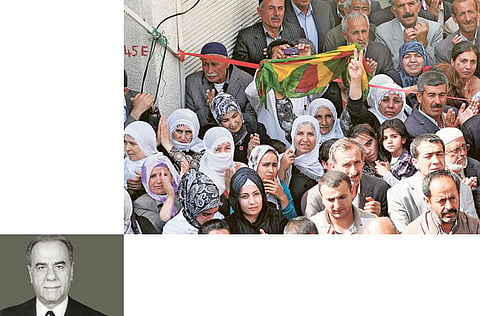Save Iraq from its leaders
The country risks breaking up unless the various factions rise above their narrow sectarian interests and agree on a national programme

Most Iraqis are keen to end their country’s suffering. They are equally keen on maintaining Iraq’s territorial integrity and the unity of its people. However, there are very few people who can play a role in protecting Iraq from collapsing and being torn apart.
This dangerous imbalance in the ambition to advance Iraq on the one hand and the lack of abilities to achieve it on the other is a source of great anxiety.
The Iraqis have placed their destiny in the hands of a few politicians who do not share their dreams and aspirations.
Most politicians repeat statements about the unity of Iraq and its people, saying this is a red line no one is allowed to cross. They try to convince people about their dedication towards Iraq, but their conduct in reality does not reflect this. This is because all they do is support those who seek to dismantle the country and respond to the orders of sectarian leaders.
Since the last parliamentary elections, the situation has become increasingly unstable. It has worsened lately with the preparations taking place for the US military to pull out of the country by the end of this year.
Violence has escalated and political assassinations have increased. Moreover, statements and counter statements by different blocs have acquired a more hostile tone. Voices calling for the setting up of federal entities are clearly on the rise, and accordingly, the fear for Iraq’s future is becoming definitely more pronounced.
The intentions of dismantling Iraq are not new. The notion is upheld by some regional forces as well. Fracturing Iraq may also be on the US agenda, as Washington has started re-drawing the map of the entire Middle East.
Iraq’s controversial constitution has also translated these intentions into legal clauses, rendering the division of the country on the basis of the constitution an achievable goal.
There are renewed efforts in this direction, following the toppling of the Baathist regime in 2003, and the chaos which followed.
There are many reasons for this new trend, such as the need for security and stability and the futility of the central government. Other factors entail protecting the country against foreign and regional machinations, while financial gains of governorates may also be added to the list of reasons for breaking up the country into federal entities. Some governorates are also under the influence of regional powers that favour weakening the country.
Cause for concern
The political process, which resulted in a weak government that is not capable of protecting the country, is a cause for concern.
The widespread corruption and the obstacles put in the path of those trying to uproot or reduce it is another cause for concern.
The total failure to offer basic services to people has eroded trust in the government’s capability, and has resulted in calls for setting up federal entities in Basra, Anbar and other governorates, to be treated on par with Iraqi Kurdistan. It is not going too far to assume that this may lead to calls for a break-up of Iraq.
The Kurds may have a case in this respect, given their separate language and unique geopolitical situation. However, other governorates in Iraq do not have reasons to justify such a situation.
The tense situation between Erbil and Baghdad has reached new heights, leading to an exchange of accusations regarding fundamental issues such as the oil and gas law and the Erbil agreement, which paved the way for the establishment of the current government. There is also the Article 140 of the constitution, which the Kurds insist on applying regarding Kirkuk.
These relations have reached an unprecedented low, especially after the Jordanian government ignored the capital Baghdad, sending Maarouf Al Bikheet, Jordan’s Prime Minister, to visit Erbil instead.
Another source of concern is the tension between Arabs, Kurds and Turkmens in Kirkuk, with the approaching US withdrawal from the governorate and increasing fears of violence.
The insistence of Turkmens in Kirkuk to establish a military force to protect themselves after a systematic campaign to assassinate their elites is also cause for concern, although the Turkmen say they need this force as they have given up on the government that is incapable of protecting them.
Despite the fact that sectarianism is no longer main issue as was the case a few years ago, there is concern that its dying embers will be rekindled as long as there are influential political leaders who are interested in awakening this monster.
The fierce tensions between Anbar and Karbala, which is the result of the crime which took place in Anbar a few weeks ago against civilians from Karbala, Baghdad and Anbar, is an indicator of how easily sectarian strife can return to the country.
The political forces are completely helpless and unable to emerge from their narrow circles to seek a national programme to lay down national constants that may protect Iraq.
Dr Mohammad Akef Jamal is an Iraqi writer based in Dubai.


